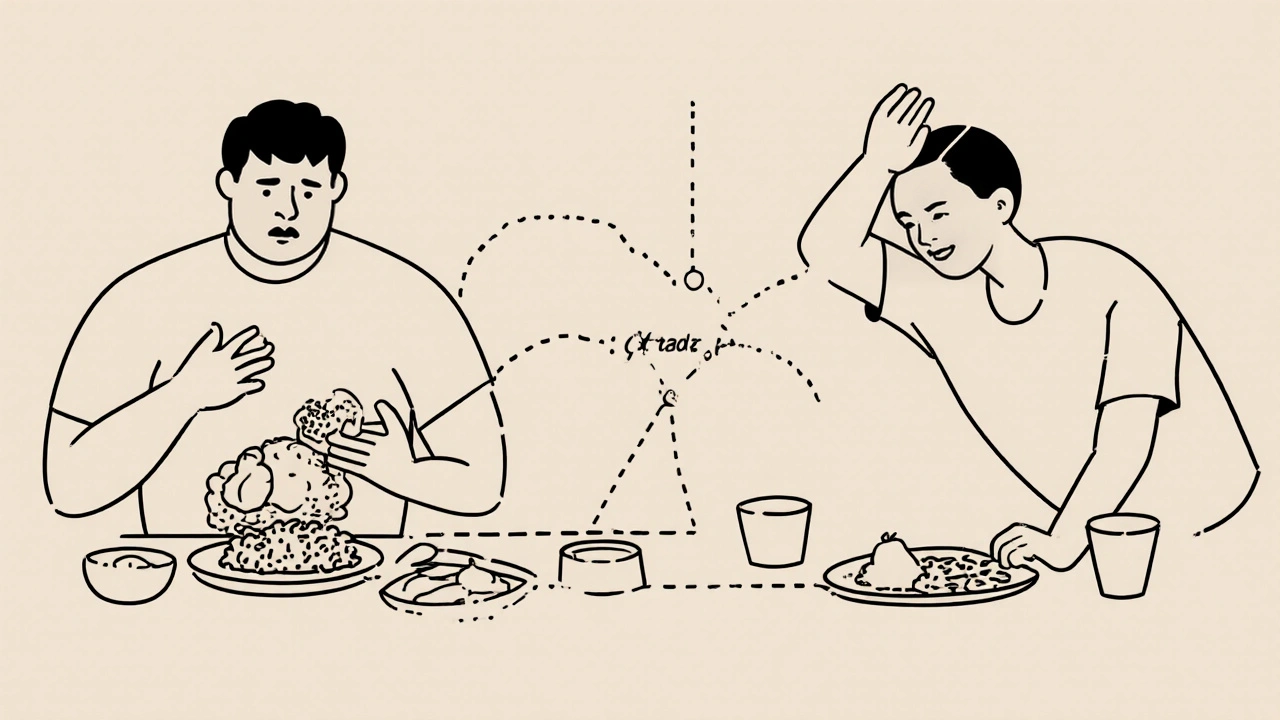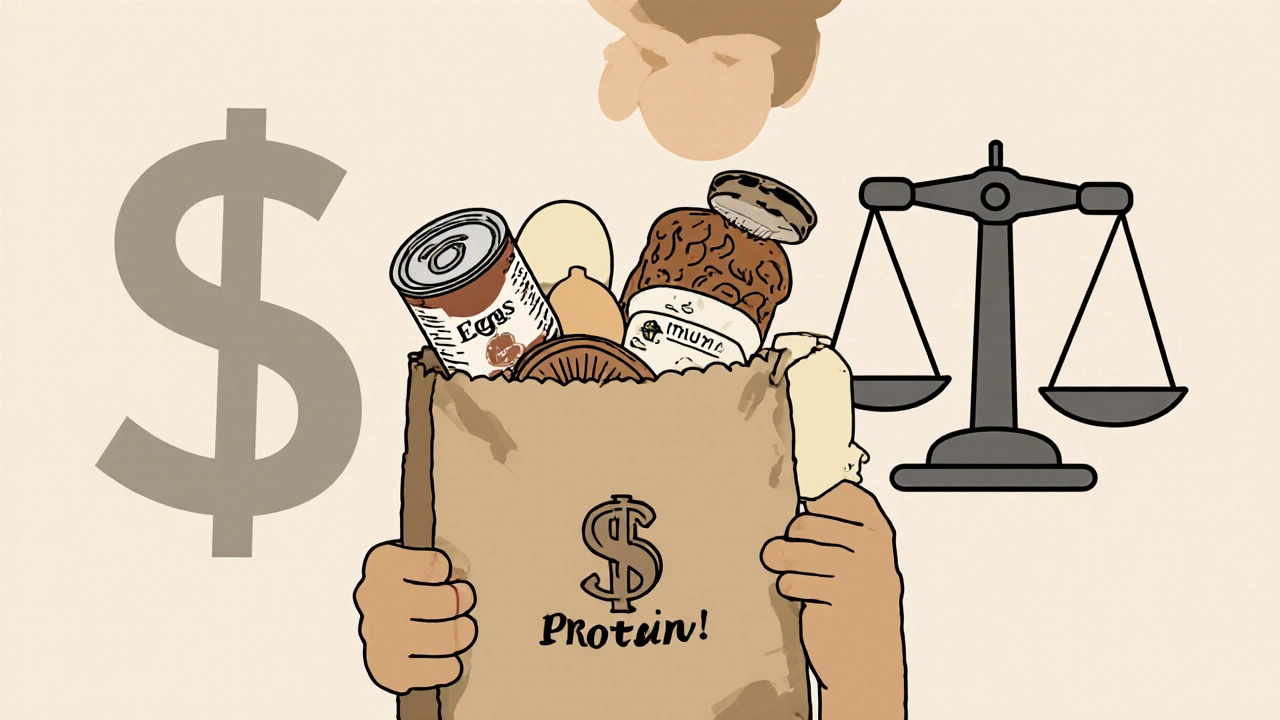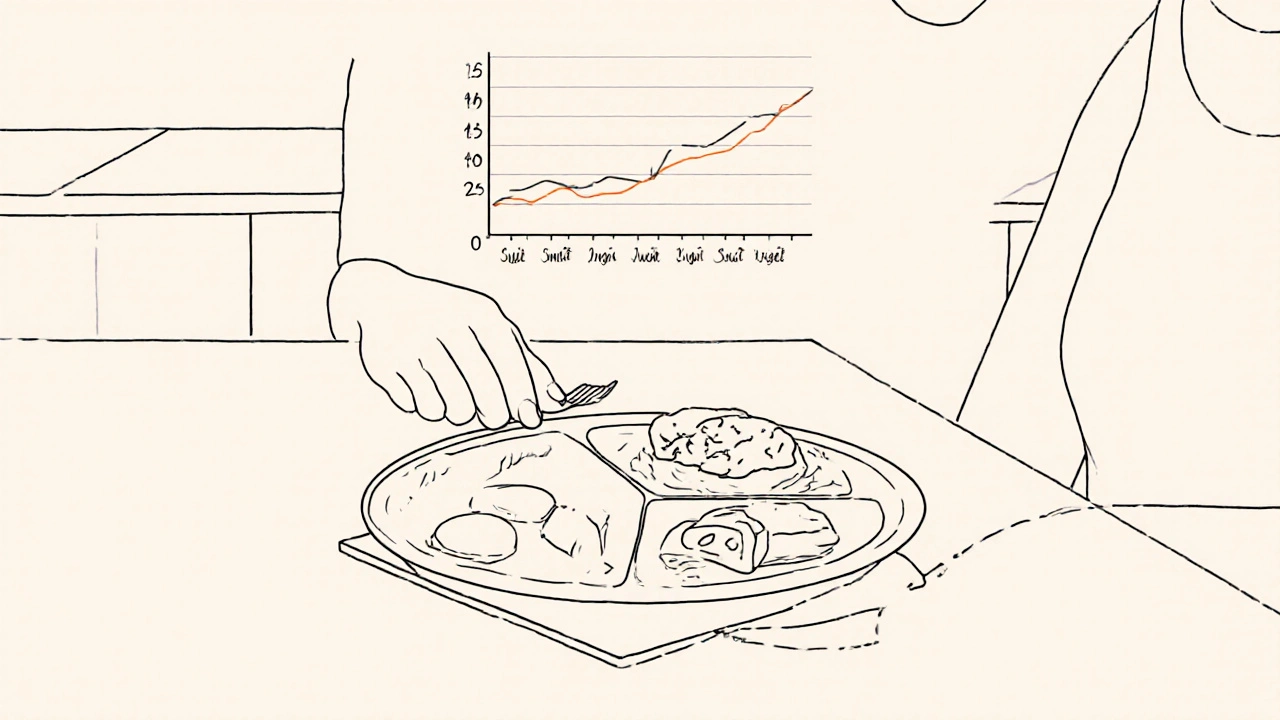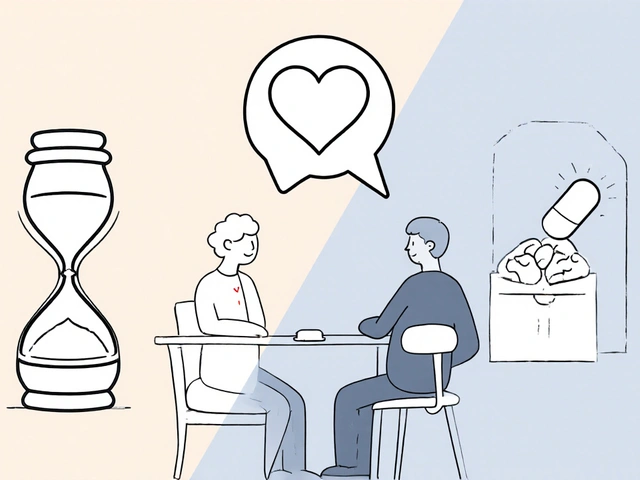Why Eating More Protein Isn’t Just for Bodybuilders
If you’ve ever tried to lose weight, you know the struggle: hunger hits hard, cravings creep in, and no matter how hard you try, you feel like you’re eating less but still starving. Then there’s the fear of losing muscle - not just fat - and waking up one day feeling weaker, flabbier, and more tired than before. What if the solution isn’t eating less, but eating smarter? That’s where protein prioritization comes in.
This isn’t a new fad. It’s not about chugging protein shakes all day or eating nothing but chicken breasts. It’s a science-backed strategy: intentionally getting enough protein at every meal to help you feel full longer and hold onto your muscle while you drop fat. And it works - whether you’re 25 or 65, active or mostly sedentary.
How Protein Keeps You Full (And Why Carbs Don’t)
Think about the last time you ate a bowl of oatmeal for breakfast. You were full for an hour. Then you were hungry again. Now think about a plate of eggs with grilled chicken and spinach. You stayed satisfied until lunch. Why? Protein triggers real biological changes in your body.
When you eat protein, your gut releases hormones like peptide YY and GLP-1 - natural appetite suppressants. At the same time, it lowers ghrelin, the hormone that screams “FEED ME!” Studies show protein can boost fullness hormones by up to 25% and slash hunger signals by 13% compared to carbs or fats. That’s not a small difference. That’s the difference between snacking at 11 a.m. and making it to lunch without reaching for chips.
Carbs spike blood sugar, then crash. Fats slow digestion but don’t turn off hunger the same way. Protein? It tells your brain, “We’re good. We’ve got fuel.” That’s why people on high-protein diets report fewer cravings and less binge eating - even when they’re cutting calories.
How Much Protein Do You Actually Need?
The old RDA of 0.8 grams per kilogram of body weight? That’s the bare minimum to avoid deficiency - not enough to preserve muscle during weight loss. If you’re trying to lose fat and keep your strength, you need more.
For most adults, the sweet spot is 1.6 grams of protein per kilogram of body weight per day. That’s about 110 grams for a 150-pound person. Some people benefit from going up to 2.2 g/kg, especially if they’re lifting weights or over 65. But more than that? You’re not getting extra muscle benefits - just paying more for food.
Here’s the math: if you weigh 70 kg (about 154 lbs), aim for 112 grams of protein daily. Split that across 3-4 meals. That’s roughly 30-40 grams per meal. Why not just eat it all at dinner? Because your body can only use so much at once. Muscle protein synthesis maxes out around 30 grams per sitting. Eat more than that in one meal? The rest gets burned or stored - not used for muscle repair.
Protein Timing: It’s Not Just About Total Amount
Two people eat the same 120 grams of protein a day. One eats 40g at breakfast, 40g at lunch, 40g at dinner. The other eats 10g at breakfast, 20g at lunch, and 90g at dinner. Who preserves more muscle? The first one.
Research from Wageningen University shows that evenly spreading protein across meals - especially including protein at breakfast - is more effective than cramming it all into one meal. Why? As we age, our muscles become resistant to stimulation. That’s called “anabolic resistance.” A strong protein dose at breakfast helps flip that switch back on.
For people who work out, timing matters even more. Getting 20-30g of protein within 45 minutes after lifting weights helps your body rebuild muscle faster. But don’t stress if you miss it - the window isn’t as narrow as once thought. Just make sure you get your daily total, and spread it out as best you can.

What Counts as High-Quality Protein?
Not all protein is created equal. The best sources contain all nine essential amino acids - especially leucine, the key trigger for muscle growth. You need about 2.5-3.0 grams of leucine per meal to hit that sweet spot.
Here’s what gets you there:
- 30g of whey protein powder = 2.8g leucine
- 100g chicken breast = 2.7g leucine
- 1 large egg = 0.6g leucine (so eat 4-5 eggs for a full dose)
- 1 cup cottage cheese = 2.5g leucine
- 100g tofu = 1.4g leucine (you’d need 200g to hit the target)
Animal proteins like eggs, dairy, meat, and fish score higher on protein quality scales (PDCAAS and DIAAS) because they’re more easily digested and packed with the right amino acids. Plant proteins - beans, lentils, tofu, tempeh - are great, but they often lack enough leucine or are harder to digest. To make them work, you need to combine them (like rice + beans) or add a leucine boost (like a sprinkle of soy protein isolate).
What Happens If You Don’t Eat Enough Protein While Losing Weight?
Here’s the scary part: if you cut calories without enough protein, you lose muscle - not just fat. One 2023 study tracked 120 older men losing weight. Those eating 0.8g/kg lost muscle. Those eating 1.6g/kg preserved nearly all of theirs. The difference? 1.3 kg more muscle retained.
That’s not just about looking good. Muscle is your metabolic engine. The more you have, the more calories you burn at rest. Lose muscle, and your metabolism slows down. That makes it harder to keep weight off. It also increases your risk of falls, frailty, and injury - especially as you age.
Compare that to high-carb diets during weight loss. One analysis found people lost 37% more muscle on low-protein, high-carb plans than on protein-prioritized ones. That’s not a trade-off you want to make.
Cost, Convenience, and Real-Life Challenges
Yes, eating more protein can be expensive. Chicken, fish, eggs, and whey protein cost more than rice, pasta, and bread. USDA data shows high-protein diets can raise food bills by 18%. That’s why many people quit after a few months.
But it doesn’t have to break the bank. Here’s how to do it affordably:
- Buy canned tuna or sardines - $0.12 per gram of protein
- Use eggs - cheap, versatile, and packed with leucine
- Choose Greek yogurt over flavored versions (no sugar, more protein)
- Batch cook chicken or lentils on Sundays
- Use plant proteins like tofu and tempeh as fillers, not your only source
Also, don’t fall into the trap of thinking you need protein powder. Most people get enough from whole foods. Powder is just a shortcut - not a requirement.
Side Effects and What to Watch For
Some people worry about kidney damage from high protein. That’s a myth - unless you already have kidney disease. Healthy kidneys handle protein just fine. But if you’re eating more than 2.5g/kg/day, you might get dehydrated. Drink more water. Aim for 2-3 liters a day.
Another common issue: constipation. Cutting carbs often means cutting fiber. If you’re eating more chicken and eggs, you might be missing veggies, beans, and whole grains. Add a side of broccoli, a handful of berries, or a tablespoon of chia seeds to every meal. Fiber keeps your gut happy.
And yes - some people get bloating or gas when they suddenly increase protein, especially with whey or soy. Switch to egg white or pea protein if that happens. Slowly increase your intake over a few weeks to let your gut adjust.

Who Benefits Most - And Who Doesn’t?
Protein prioritization works best for people who:
- Are actively trying to lose weight
- Are over 50 (to fight muscle loss)
- Do resistance training (even light weights)
- Struggle with hunger or cravings during dieting
It’s less critical for:
- Sedentary people not trying to lose weight
- Those with normal body weight and no muscle loss concerns
- People who can’t afford or access protein-rich foods
And here’s something surprising: protein doesn’t automatically make you stronger. It preserves muscle mass - but strength gains still come from lifting weights. If you’re not training, you won’t get stronger, even with 2g/kg of protein.
Real People, Real Results
On Reddit, user ‘GainsByScience’ lost 42 pounds over six months while keeping 97% of his muscle - all by eating 1.8g/kg of protein and hitting 40g per meal. His secret? “I didn’t starve. I just ate more protein and felt full.”
On the flip side, ‘BudgetShredder’ on MyFitnessPal gave up after three months: “I was spending $97 a week on chicken and protein powder. It wasn’t sustainable.” That’s the trade-off. It works - but it needs planning.
The National Weight Control Registry tracks over 5,400 people who’ve lost weight and kept it off for at least a year. 83% of them intentionally prioritized protein. Their average intake? 1.5g/kg - just below the recommended 1.6g/kg. They didn’t go overboard. They just made sure protein was never an afterthought.
What’s Next for Protein Research?
Science is moving fast. In 2025, companies like Nutrisense and Levels Health started using glucose monitors to time protein intake based on your body’s real-time response. The idea? Eat protein when your blood sugar dips - that’s when your body needs it most for muscle repair.
The 2026 Dietary Guidelines are expected to raise the minimum recommendation from 0.8g/kg to 1.0g/kg - a huge shift, based on evidence that even 1.0g/kg reduces sarcopenia risk by 15% in older adults.
And if you’re doing time-restricted eating (like 16:8 fasting)? You might need 20% more protein to make up for the shorter eating window. That’s new advice from MIT researchers in early 2025.
Final Takeaway: Protein Isn’t a Magic Bullet - But It’s the Best Tool We Have
You don’t need to eat like a bodybuilder. You don’t need to track every gram. You just need to make protein a priority - not an option.
Start here:
- Calculate your daily protein goal: weight in kg × 1.6
- Divide that into 3-4 meals (aim for 25-40g per meal)
- Include a protein source at breakfast - even if it’s just eggs or Greek yogurt
- Pair protein with fiber (veggies, beans, fruit) to avoid digestive issues
- Drink water - at least 2 liters a day
- Use affordable sources: eggs, canned fish, tofu, cottage cheese
Protein prioritization isn’t about perfection. It’s about consistency. Do it for a few weeks, and you’ll notice the difference - less hunger, more energy, and a body that holds onto what matters most: your strength, your mobility, and your health.
How much protein do I need to preserve muscle while losing weight?
For most adults, aim for 1.6 grams of protein per kilogram of body weight per day. That’s about 110-130 grams daily for a 150-180 pound person. If you’re over 65 or lifting weights, you can go up to 2.2 g/kg. Below 1.0 g/kg, you risk losing muscle during weight loss.
Is plant-based protein enough for muscle preservation?
Plant proteins can work, but they’re less efficient. Most plant sources lack enough leucine - the key amino acid that triggers muscle growth. To make it work, combine different plants (like rice and beans), eat larger portions, or add a leucine boost like soy protein isolate. Animal proteins like eggs, dairy, and meat are more effective per gram.
Do I need protein powder to get enough protein?
No. Most people can meet their protein needs with whole foods like eggs, chicken, fish, Greek yogurt, cottage cheese, tofu, and legumes. Protein powder is a convenient shortcut - especially post-workout - but not required. Focus on meals first, then use powder if you’re falling short.
Will eating more protein hurt my kidneys?
No - not if your kidneys are healthy. Studies show high protein intake doesn’t damage kidneys in people without pre-existing disease. But if you have kidney issues, talk to your doctor. Also, drink plenty of water - 2-3 liters a day - to help your body process the extra protein.
Why am I constipated since I started eating more protein?
High-protein diets often mean cutting carbs - and that can mean cutting fiber too. Add more vegetables, fruits, beans, chia seeds, or psyllium husk to your meals. Aim for 25-30 grams of fiber daily. That will fix most digestive issues.
Is protein prioritization worth the cost?
It can be more expensive - up to 18% higher food costs. But you can cut costs by buying eggs, canned tuna, cottage cheese, tofu, and cooking in bulk. The payoff? Less hunger, better body composition, and a higher chance of keeping weight off long-term. For many, the health benefits outweigh the cost.
Does protein help with weight loss maintenance?
Yes - and that’s where it really shines. Data from the National Weight Control Registry shows 83% of people who successfully kept off 30+ pounds for years intentionally prioritized protein. It helps control hunger, prevents muscle loss, and keeps your metabolism from slowing down - all critical for long-term success.






Reema Al-Zaheri
Protein prioritization is not a fad-it’s a metabolic imperative. The science is unequivocal: 1.6g/kg/day is the minimum threshold for muscle preservation during caloric restriction, not a recommendation. The body’s muscle protein synthesis peaks at ~30g per meal, and any excess beyond that is oxidized, not stored. This isn’t opinion; it’s biochemistry. Skipping protein at breakfast is like starting a car with an empty tank and expecting to reach the destination.
Michael Salmon
Let’s be real-this whole ‘protein prioritization’ thing is just keto with a different name. You’re just swapping carbs for expensive chicken. And don’t even get me started on the ‘leucine threshold’ nonsense. You think your body doesn’t know how to use amino acids unless you’ve got a spreadsheet? I’ve eaten beans and rice my whole life and I’m still stronger than half the gym bros posting this crap.
Joe Durham
I appreciate the depth here, but I think Michael’s point about affordability is valid. I’m a single dad working two jobs, and $97/week on chicken isn’t an option. I’ve been using canned salmon, eggs, and lentils-and yes, I combine them with rice to get complete proteins. It’s not perfect, but it’s sustainable. Maybe the real takeaway isn’t ‘eat more protein’ but ‘eat protein smartly, within your means.’
Derron Vanderpoel
OMG I JUST REALIZED WHY I’VE BEEN SO CONSTIPATED!! I’ve been eating 4 eggs and 2 chicken breasts a day and zero veggies… I thought it was ‘detoxing’ 😭 I just added a banana and chia seeds to my smoothie and I feel like a new person. Thank you for this!!
Timothy Reed
This is one of the most balanced and evidence-based pieces on protein and weight loss I’ve seen in a long time. The emphasis on distribution across meals, the clarification on kidney safety, and the practical cost-saving tips make this actionable-not theoretical. The National Weight Control Registry data is particularly compelling. Consistency, not perfection, is the key-and this framework supports that beautifully.
Christopher K
Of course it works. Americans are too lazy to cook. Back in my day, we ate meat at every meal and didn’t need a 2000-word article to tell us protein keeps you full. Now we need a PhD in amino acid leucine thresholds just to boil an egg. This is why our country is falling apart-overcomplicating the simple. Eat meat. Move. Stop whining.
harenee hanapi
Wait, so you’re telling me I’ve been doing this wrong for YEARS? I thought tofu was enough! Now I feel like I’ve been betrayed by my vegan friends. And what about my mom? She’s 72 and eats oatmeal with almond butter every morning-she’s got no muscle left, but she says she’s ‘healthy.’ I’m just… heartbroken. This article broke me.
Christopher Robinson
Love this! 🙌 Seriously, the breakdown of leucine content per food is GOLD. I’ve been using cottage cheese for breakfast since I read this and I’m not craving snacks by 10am anymore. Also-DRINK WATER. I forgot that and got a headache. Now I keep a 1L bottle at my desk. Small changes, big results. 💪
James Ó Nuanáin
While the scientific underpinnings of protein prioritization are, indeed, compelling, one must not overlook the socio-economic determinants of nutritional adherence. In the United Kingdom, where the cost of living continues to escalate, the proposition that 1.6g/kg/day is universally attainable is, frankly, a luxury assumption. The assertion that plant proteins are ‘less efficient’ requires contextualisation: in regions where animal protein is culturally or ethically disfavored, the nutritional imperative must be met through fortified alternatives or supplementation-yet these are often inaccessible. This discourse, while academically rigorous, risks alienating those it purports to help.